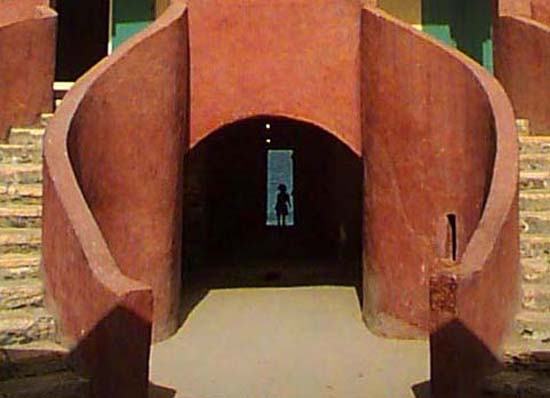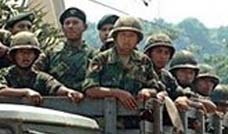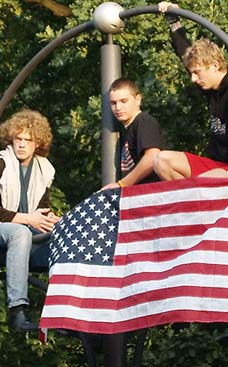
Wilkins has taken that to heart, but he's trying to go as prepared as possible for Senegal. He's packed an array of luxury items -- including his laptop, iPod and a solar-powered generator -- and essentials such as blankets and lamps. "I definitely overpacked," he says. "But I'll grow out of it, I guess." He knows the region he has been assigned to has no running water or electricity, but says his primary apprehension is the cultural divide. "I'm intimidated by the language a little," he says, and he's continuing to learn Senegal's official language, French.
Kevin Wilkins prepares for his return to Senegal, where he will help subsistence farmers increase crop yields
Peace Corps volunteers out to change world -- and themselves
BY WALLACE MCKELVEY • THE NEWS JOURNAL •
SEPTEMBER 23, 2008
Standing in a nondescript room at a Days Inn, Kevin Wilkins prepares for his return to Africa, where he will help subsistence farmers increase crop yields.
"I've got butterflies right now," the 27-year-old former Marine said on a recent Thursday night. "I'm more intimidated from this undertaking than the Marine Corps."
In the morning, Wilkins will board a plane for Senegal and two years as an agro-forestry agent for the Peace Corps. He will join 8,079 volunteers, including 25 Delawareans, who serve in 74 countries working to improve education, infrastructure and health care as well as global perceptions of the United States.
"I think: Wow, you're going to be a different person coming out the back end of this," he says.
Chris Wagner, a Delaware recruiter for the Peace Corps, says the experiences and leadership skills he acquired as a volunteer in Thailand now serve as the backbone of his résumé, particularly the installation of a pump to supply clean water.
"I worked with them to apply for a grant, and, once we had the money, the whole community came out to build [the pump]," Wagner says.
Wagner says he tries not to oversell the experience to potential recruits.
"From the beginning, it was hot, and there were days when no one understood my language. Nothing went right," he says. "Then there were days when I didn't have to ask people to slow down when they were speaking to me. When I learned new things about the culture.
"It's the hardest thing you'll ever do, but if you're going to grow, you have to struggle."
Wilkins has taken that to heart, but he's trying to go as prepared as possible for Senegal.
He's packed an array of luxury items -- including his laptop, iPod and a solar-powered generator -- and essentials such as blankets and lamps.
"I definitely overpacked," he says. "But I'll grow out of it, I guess."
He knows the region he has been assigned to has no running water or electricity, but says his primary apprehension is the cultural divide.
"I'm intimidated by the language a little," he says, and he's continuing to learn Senegal's official language, French.
Stephen Chapman, public affairs specialist for the Peace Corps, says all volunteers undergo three months of in-country training in the local language, customs and technical skills required for their position.
"One of the challenges is adapting to a new culture," he says. "But that's something that the Peace Corps can help Kevin with."
Wagner follows many applicants, including Wilkins, through the long application process.
"There are nine months to a year from the time you press 'Send' on the application to the time you get on a plane," he says.
Once the application is submitted, Wagner says, prospective volunteers are interviewed by a recruiter. The recruiter determines which applicants to nominate for the program and provides a recommendation for placement.
This is followed by an evaluation of the volunteer's medical history, which usually takes three months to clear. The corps wants to make sure they're not sending someone with a health problem to a country with little medical care. Applicants are then invited into the program. Before volunteers depart for their assignments, they meet other volunteers from the region.
With budget cuts, the declining dollar and increasing expenses, Wagner says the application process has become increasingly competitive.
"General applicants need additional experience, such as ... vegetable gardening or first aid certification," he said.
Wilkins has many. One of them is that this assignment sends him back to Africa, where he spent the summer of 2006 working in Tanzania as a nursery school teacher for a religious charity.
"It was incredible to stand up there in front of the kids," he said. "The neatest thing I taught them was 'I'm a Little Teapot.'" After high school, Wilkins didn't feel called to any particular career, so he joined the Marines and spent four years in the Marine Corps Silent Drill Platoon, a marching unit that performs at exhibitions and NFL halftime shows.
In 2005, while studying communications at Lynn University, in Boca Raton, Fla. -- from which he would earn a bachelor's degree in communications -- Wilkins served as a White House intern and distributed blankets and supplies to Hurricane Katrina victims at a National Guard armory.
"I'm looking at everything with big eyes," Wilkins said. "I'm ready to go."
Contact the editor of this section at 324-2884 or bprice@delawareonline.com.












